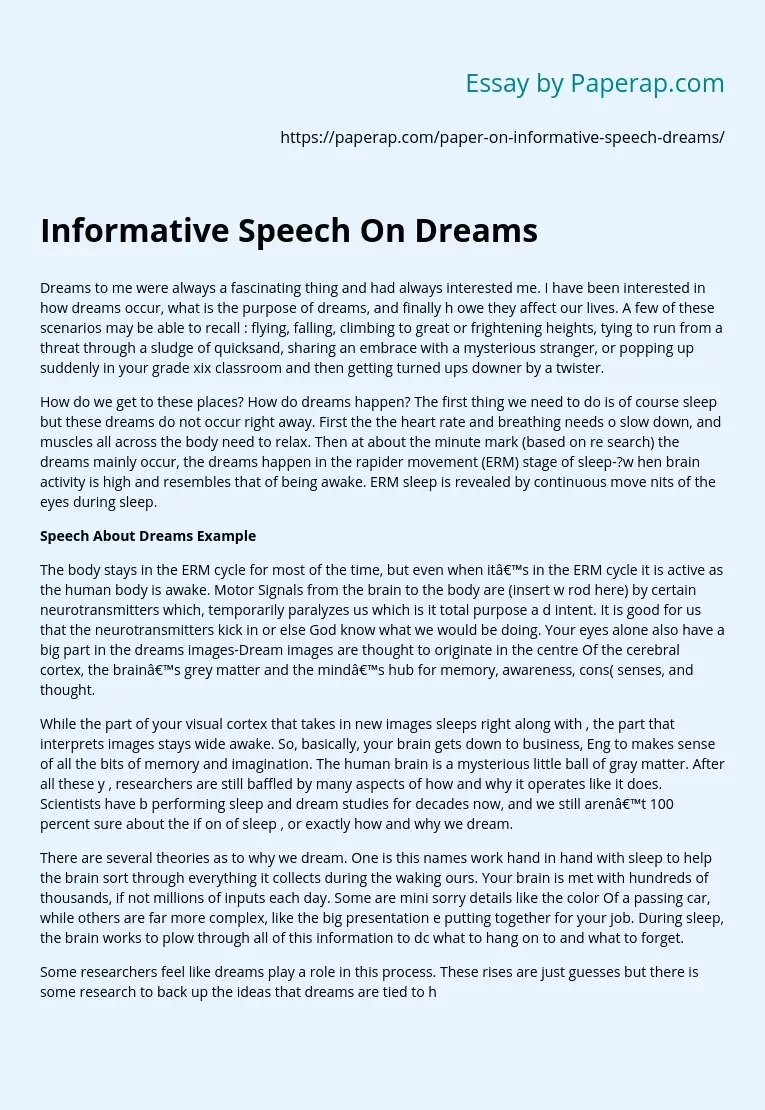Informative Speech On Dreams
Dreams to me were always a fascinating thing and had always interested me. I have been interested in how dreams occur, what is the purpose of dreams, and finally h owe they affect our lives. A few of these scenarios may be able to recall : flying, falling, climbing to great or frightening heights, tying to run from a threat through a sludge of quicksand, sharing an embrace with a mysterious stranger, or popping up suddenly in your grade xix classroom and then getting turned ups downer by a twister.
How do we get to these places? How do dreams happen? The first thing we need to do is of course sleep but these dreams do not occur right away. First the the heart rate and breathing needs o slow down, and muscles all across the body need to relax. Then at about the minute mark (based on re search) the dreams mainly occur, the dreams happen in the rapider movement (ERM) stage of sleep-?w hen brain activity is high and resembles that of being awake.
ERM sleep is revealed by continuous move nits of the eyes during sleep.
Speech About Dreams Example
The body stays in the ERM cycle for most of the time, but even when it’s in the ERM cycle it is active as the human body is awake. Motor Signals from the brain to the body are (insert w rod here) by certain neurotransmitters which, temporarily paralyzes us which is it total purpose a d intent.
It is good for us that the neurotransmitters kick in or else God know what we would be doing. Your eyes alone also have a big part in the dreams images-Dream images are thought to originate in the centre Of the cerebral cortex, the brain’s grey matter and the mind’s hub for memory, awareness, cons( senses, and thought.
While the part of your visual cortex that takes in new images sleeps right along with , the part that interprets images stays wide awake. So, basically, your brain gets down to business, Eng to makes sense of all the bits of memory and imagination. The human brain is a mysterious little ball of gray matter. After all these y , researchers are still baffled by many aspects of how and why it operates like it does. Scientists have b performing sleep and dream studies for decades now, and we still aren’t 100 percent sure about the if on of sleep , or exactly how and why we dream.
There are several theories as to why we dream. One is this names work hand in hand with sleep to help the brain sort through everything it collects during the waking ours. Your brain is met with hundreds of thousands, if not millions of inputs each day. Some are mini sorry details like the color Of a passing car, while others are far more complex, like the big presentation e putting together for your job. During sleep, the brain works to plow through all of this information to dc what to hang on to and what to forget.
Some researchers feel like dreams play a role in this process. These rises are just guesses but there is some research to back up the ideas that dreams are tied to how h, Oromo memories. Studies indicate that as we’re learning new things in our waking hours, dreams increase w we sleep. Participants in a dream study who were taking a language course showed more dream act Han those who were not. Another theory’ is that dreams typically reflect our emotions. During the d our brains are working hard to make connections to achieve certain functions.
When posed with a tough h problem, your brain is incredibly focused on that one thing. And the brain doesn’t only serve me functions. If you’re building a bench, your brain is focused on making the right connections to allow you ends to work in concert with a saw and some wood to make an exact cut. The same goes for simple task e hitting a nail with a hammer. Have you ever lost focus and smashed your finger because your mind was else where? Some have proposed that at night everything slows down.
We aren’t required to focus on anything during sleep, so our brains make very loose con injections. It’s during sleep that the emotions of the day battle it out in our dream cycle. If something is weighing heavily on your mind during the day, chances are you might dream about it either specifically, or through obvious imagery. For instance, if you’re worried about losing your job to company downsizing, you may dream you’re a shrunken person living in a woo RL of giants, or you’re wandering aimlessly through a great desert abyss.
There’s also a theory, define tell the least intriguing of the bunch, that dreams don’t really serve any function at all, that they’re just a poi nettles byproduct of the brain firing while we slumber. We know that the rear portion of our brain gets pretty y active during ERM sleep, when most dreaming occurs. Some think that it’s just the brain winding down for the night and that dreams are random and meaningless firings of the brain that we don’t have when we’ re awake. The truth is, as long as the brain remains such a mystery, we probably won’t be able to pinpoint w tit absolute certainty exactly why we dream.
Informative Speech On Dreams. (2019, Dec 05). Retrieved from https://paperap.com/paper-on-informative-speech-dreams/

